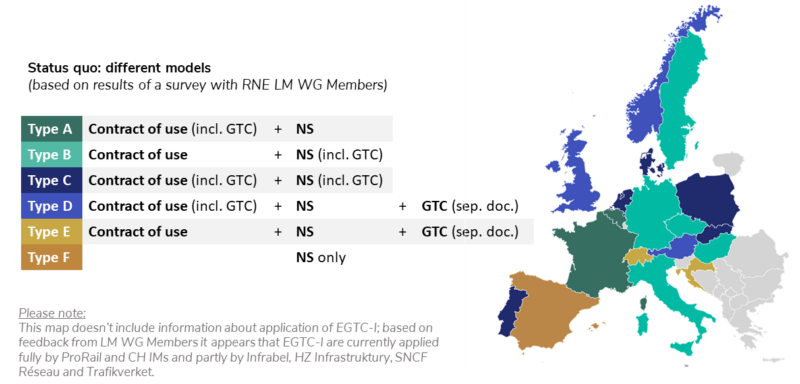One central objective of the RNE Legal Matters Working Group (LM WG) is to improve business relations between Infrastructure Managers and Railway Undertakings. In this regard, the LM WG has launched a project dealing with the harmonisation of the contractual framework for international rail transport.
The aim of this project is to develop a common approach for the design of contractual relations with customers, which today are characterised by a large variety of different practices:

In this context, a task force of members of the LM WG has started to look at existing contracts of use of the infrastructure, general terms and conditions and relevant elements of Network Statements with the objective of defining common structures for these documents (taking into account the already existing Network Statement Common Structure) and assessing the need for common text (see Vision for Harmonisation of Contractual Framework, as approved by the RNE General Assembly in December 2019.)
As a first result of the project, in May 2021 RNE and CIT (the International Rail Transport Committee) agreed on a European Standard Contract of Use of Railway Infrastructure (E-SCU-I), which consists of a common structure and wording proposals for such contracts together with an accompanying Implementation guide. The E-SCU-I constitutes a toolbox for the design of contracts of use representing a standard of best practices, which shall support Railway Undertakings and Infrastructure Managers in designing their contractual relations in an increasingly harmonised way, without being binding.
Besides that, the LM WG is remains in close contact with RFC ScanMed, which is pursuing a pilot project with the aim of testing a ‘single contract of use’ on its Corridor.
The current RNE project follows up on previous initiatives in this domain, such as the work on a set of European General Terms and Conditions for the use of infrastructure (E-GTC-I) negotiated between RNE and CIT and first attempts of RNE to design a standard contract of use of the railway infrastructure, dating back to 2004.